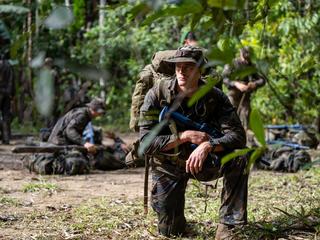
First Australian Soldier to pass jungle warfare course
Up to his waist in mud, with a pack and the oppressive Amazon jungle humidity weighing him down, Sergeant Matthew Reid began to think he made a mistake.
A few weeks earlier, the training adviser from Jungle Training Wing arrived in French Guiana to undertake one of the world’s toughest jungle warfare courses.
Run by the French Foreign Legion, the eight-week Jaguar course is designed to train French lieutenants and sergeants to lead soldiers in jungle environments.
Those who successfully complete it are permitted to wear the coveted jaguar brevet.
Despite some initial nerves and a slight language barrier, Sergeant Reid settled in with the other participants, some of whom were also international.
“I learned some basic French – introductions and counting, left and right. There’s a minimum vocabulary to learn before the course,” he said.
After a week of acclimatisation, including environmental briefs, kit issue, weapon and physical training, participants had to pass a physical test to move onto the next phase.
“They basically run everywhere on the course, so it was good that before I left I did lots of running, bodyweight, and a lot of upper body strength,” Sergeant Reid said.
The next phase was two weeks of aguerrissement, which translates to hardening. This is when Sergeant Reid found himself covered in mud, rethinking his choices.
His section was conducting a stretcher carry over a 600m course, through waist-deep sucking mud the whole way, with two hours to complete it.
“I had to use my hands to lift up my leg and put that foot in front and then I’d fall over to the side. I was a bit of a liability on that one,” he said.
“I really enjoyed the rest of the course; there were definitely other difficult parts but that was the only time I thought about quitting.”
Despite being physically drained, knowing the task was only two hours long kept Sergeant Reid pushing until the end.
None of the sections completed the obstacle.
Participants then dropped into the jungle for a three-day survival exercise with patrol orders and tasks to complete, including building a shelter and fire, and eating only what they could forage or hunt.
Next was the combat phase, which comprised a week learning the Legions’ tactics, techniques and procedures, before two weeks of back-to-back missions, hand-to-hand combat, shooting, and finishing with SERE-B (Survival/Evasion/Resistance/Escape).
Instruction was given in French and those who couldn’t understand were paired with English-speaking francophiles to translate. This happened in reverse when English-speaking students gave orders.
The final phase of the course was synthesis, or combining elements, held on the island of Martinique. Students took turns leading a section through multi-day full-mission profiles, which culminated in a five-day, battalion-level exercise with the 3rd Foreign Infantry Regiment in the village of Cacao.
Surviving to the last day of course didn’t guarantee a pass. Students only found out if they were successful a few minutes before their graduation ceremony.
Names were read out in order of performance, and Sergeant Reid was relieved when his name was called – ranked 18th of 35 students – to become the first Australian to pass the course.
“I was very happy, like a big weight lifted off me,” he said.
“I loved it, probably not while I was doing it. There were definitely parts where I was like ‘this is rough’ but afterwards, I absolutely loved it. The staff from the Legion were extremely professional and incredibly proficient.
“I learned a lot about operating in jungle environments thanks to them. It was honestly a once-in-a-lifetime experience and I highly recommended it to anyone that wants to do it.”



